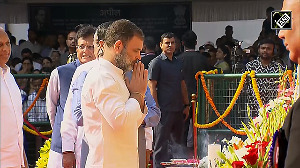India is keen to open a consulate in Jaffna, once a stronghold of the Liberation Tigers of Tamil Eelam, Foreign Secretary Nirupama Rao said on Monday, even as she pressed for political reconciliation among all communities in Sri Lanka so as to usher in peace and harmony.
Rao, who held wide ranging discussions with President Mahinda Rajapaksa, said she received a positive response from him on India's request to open a consulate in Jaffna.
"Of course, we have to work out the modalities. Because we feel our office there will help us to be in touch with the local people, help us do assistance programmes, help issue visas," she said.
Rao said opening an Indian mission in Jaffna will ultimately help the bilateral relationship and it would also benefit the people of northern Sri Lanka to see connectivity restored with southern India. India has only one consulate in Kandy, the Sinhala dominated area.
At the conclusion of her three-day visit to the Sri Lanka, the top Indian diplomat said that during her two-hour discussion with Rajapaksa on Sunday, the early resettlement of Internally Displaced Persons also came up for talks.
"People in the north want to experience normal life once again. They are not in favour of extremism. They want normal lives. They want connectivity with India, cultural renaissance, tourism," she said.
Congratulating the President on his massive electoral victory, Rao underlined that the elimination of terrorism and holding elections provided Sri Lanka a historic opportunity to initiate a process of political reconciliation, where all communities can live in peace and harmony.
The Lankan president appreciated India's substantial assistance for the rehabilitation and reconstruction of northern and eastern Sri Lanka and for the resettlement of displaced persons.
He particularly highlighted the extension of $425 million credit for railway projects in northern Sri Lanka.
Rajapaksa mentioned that around 70,000 IDPs remained in the camps.
The Indian foreign secretary welcomed the relaxation of restrictions on IDPs, but also expressed hope to speed up the resettlement process, especially in former LTTE domains of Killinochchi and Mullaithivu. It would ensure that the IDPs could resume normal lives.
On the issue of Indian fishermen being arrested by the Sri Lankan coast guards, Rao noted that the October 2008 Joint Statement of Fishing Arrangements had led to a decline in such incidents. She reiterated the importance of strictly adhering to this understanding.
It was also agreed to convene a meeting of the Joint Working Group on Fishing to discuss issues related to fishermen on both sides.
During her discussions with Foreign Minister Rohitha Bogollagama, Rao underlined India's resolve to continue support for the task of development and reconstruction in northern and eastern Sri Lanka, hit by years of insurgency due to the ethnic conflict.
Rao announced India's support for housing projects, to be taken up in Kilinochchi and Mullaitivu districts, for the benefit of the IDPs. This will include setting up temporary shelters, repair and rehabilitation of damaged houses and building new ones. India has also sanctioned the supply of 55 buses to various educational, social and cultural organisations and locally elected bodies in northern, eastern and central Sri Lanka, in a bid to strengthen the transportation sector and connectivity in these areas.
The foreign secretary also indicated that additional Lines of Credit are being considered for railway projects in northern Sri Lanka, according to a release by the Indian High Commission in Colombo.
She met senior advisor to the President Basil Rajapaksa, Defence Secretary Gotabhaya Rajapaksa, Secretary to the President Lalith Weeratunga, Foreign Secretary Romesh Jayasinghe, Treasury Secretary P B Jayasundera and Central Bank Governor Ajith Nivard Cabraal. Rao also interacted with political leaders, including those from Tamil and Muslim parties.








 © 2025
© 2025